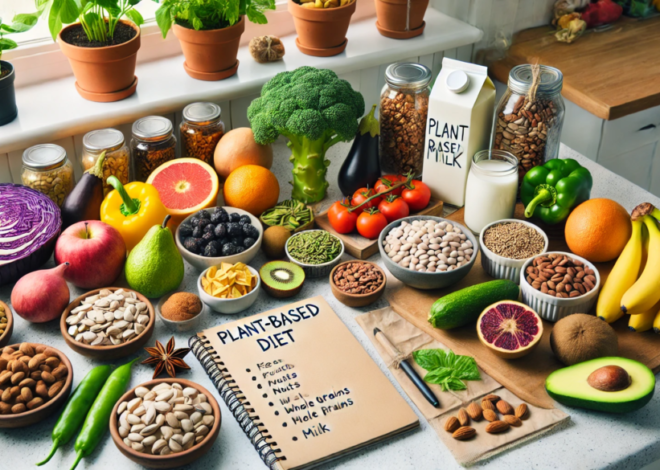
Heart-Healthy Diets: Foods That Support Cardiovascular Health
A heart-healthy diet is essential for maintaining cardiovascular health and reducing the risk of heart disease. By focusing on nutrient-dense foods and making mindful dietary choices, you can support your heart and overall well-being. This guide highlights key foods that contribute to a heart-healthy diet and their specific benefits.
Key Components of a Heart-Healthy Diet
1. Fruits and Vegetables
Fruits and vegetables are rich in vitamins, minerals, antioxidants, and dietary fiber, making them essential components of a heart-healthy diet.
- Berries: Blueberries, strawberries, raspberries, and blackberries are high in antioxidants, particularly anthocyanins, which help reduce inflammation and oxidative stress in the cardiovascular system.
- Leafy Greens: Spinach, kale, and Swiss chard are packed with vitamins, minerals, and nitrates, which help regulate blood pressure and improve arterial function.
- Avocados: Rich in monounsaturated fats and potassium, avocados help lower bad cholesterol (LDL) and maintain healthy blood pressure levels.
2. Whole Grains
Whole grains provide essential nutrients and dietary fiber, which help regulate cholesterol levels and improve heart health.
- Oats: Contain beta-glucan, a type of soluble fiber that helps lower cholesterol levels and reduce the risk of heart disease.
- Quinoa: A nutrient-dense grain rich in protein, fiber, and essential amino acids, quinoa supports overall cardiovascular health.
- Brown Rice: A whole grain that provides fiber and other nutrients beneficial for heart health.
3. Healthy Fats
Healthy fats, particularly unsaturated fats, are crucial for maintaining heart health. They help lower bad cholesterol levels and support overall cardiovascular function.
- Nuts and Seeds: Almonds, walnuts, flaxseeds, and chia seeds are excellent sources of omega-3 fatty acids, fiber, and antioxidants, which help reduce inflammation and improve heart health.
- Olive Oil: Rich in monounsaturated fats and antioxidants, extra virgin olive oil helps lower cholesterol levels and protect against heart disease.
- Fatty Fish: Salmon, mackerel, and sardines are rich in omega-3 fatty acids, which reduce inflammation, lower blood pressure, and decrease triglycerides.
4. Lean Proteins
Lean proteins provide essential nutrients without the high levels of saturated fats found in some animal products.
- Fish: In addition to being a source of omega-3 fatty acids, fish provides high-quality protein and other essential nutrients.
- Poultry: Skinless chicken and turkey are good sources of lean protein, low in saturated fats.
- Legumes: Beans, lentils, and chickpeas are excellent plant-based protein sources rich in fiber, vitamins, and minerals.
5. Herbs and Spices
Herbs and spices add flavor to dishes without the need for added salt or sugar, supporting heart health by reducing sodium and sugar intake.
- Garlic: Contains allicin, which has been shown to lower blood pressure and cholesterol levels.
- Turmeric: Contains curcumin, a compound with anti-inflammatory and antioxidant properties that support heart health.
- Cinnamon: Helps regulate blood sugar levels and has anti-inflammatory properties.
6. Beverages
Choosing heart-healthy beverages can also support cardiovascular health.
- Green Tea: Rich in catechins, green tea helps reduce cholesterol levels and improve blood vessel function.
- Infused Water: Staying hydrated is crucial for overall health. Infusing water with fruits like lemon, berries, or mint adds flavor without added sugars.
Benefits of a Heart-Healthy Diet
1. Lower Cholesterol Levels
A diet rich in whole grains, healthy fats, and fiber can help lower LDL (bad) cholesterol levels and raise HDL (good) cholesterol levels, reducing the risk of heart disease.
2. Reduced Blood Pressure
Consuming foods high in potassium, magnesium, and nitrates, such as leafy greens and avocados, can help regulate blood pressure levels and support healthy blood vessels.
3. Decreased Inflammation
Anti-inflammatory foods, including berries, fatty fish, and olive oil, help reduce inflammation, a key factor in the development of heart disease.
4. Improved Blood Sugar Control
Whole grains, nuts, seeds, and legumes help regulate blood sugar levels, reducing the risk of diabetes and associated cardiovascular complications.
5. Weight Management
A balanced, nutrient-dense diet can help maintain a healthy weight, reducing the risk of obesity-related heart conditions.
Conclusion
A heart-healthy diet is essential for maintaining cardiovascular health and preventing heart disease. By incorporating a variety of fruits, vegetables, whole grains, healthy fats, lean proteins, and herbs into your daily meals, you can support your heart and overall well-being. Making mindful dietary choices and focusing on nutrient-dense foods can significantly impact your heart health and quality of life.
Frequently Asked Questions
Can I still eat meat on a heart-healthy diet?
Yes, you can eat meat on a heart-healthy diet, but it’s important to choose lean cuts and limit red meat consumption. Opt for lean proteins like fish, poultry, and plant-based sources, such as legumes and tofu, which are lower in saturated fats.
How much fat should I include in a heart-healthy diet?
Healthy fats, particularly unsaturated fats, are an essential part of a heart-healthy diet. Aim to include sources of healthy fats like avocados, nuts, seeds, and olive oil, while limiting saturated fats found in processed foods and fatty meats.
Are all whole grains heart-healthy?
Yes, whole grains are generally heart-healthy as they contain more fiber, vitamins, and minerals compared to refined grains. Examples include oats, quinoa, brown rice, barley, and whole wheat.
How does fiber benefit heart health?
Dietary fiber, especially soluble fiber, helps reduce LDL (bad) cholesterol levels and supports healthy digestion. It also helps regulate blood sugar levels and promotes satiety, aiding in weight management.
Can a heart-healthy diet help lower high blood pressure?
Yes, a heart-healthy diet can help lower high blood pressure. Foods rich in potassium, magnesium, and nitrates, such as leafy greens, bananas, and beets, help relax blood vessels and improve blood flow, reducing blood pressure.
Is it okay to drink alcohol on a heart-healthy diet?
Moderate alcohol consumption may have some cardiovascular benefits, such as raising HDL (good) cholesterol levels. However, excessive alcohol consumption can lead to high blood pressure, obesity, and other heart-related issues. It’s best to consume alcohol in moderation, if at all, and consult with a healthcare professional for personalized advice.











